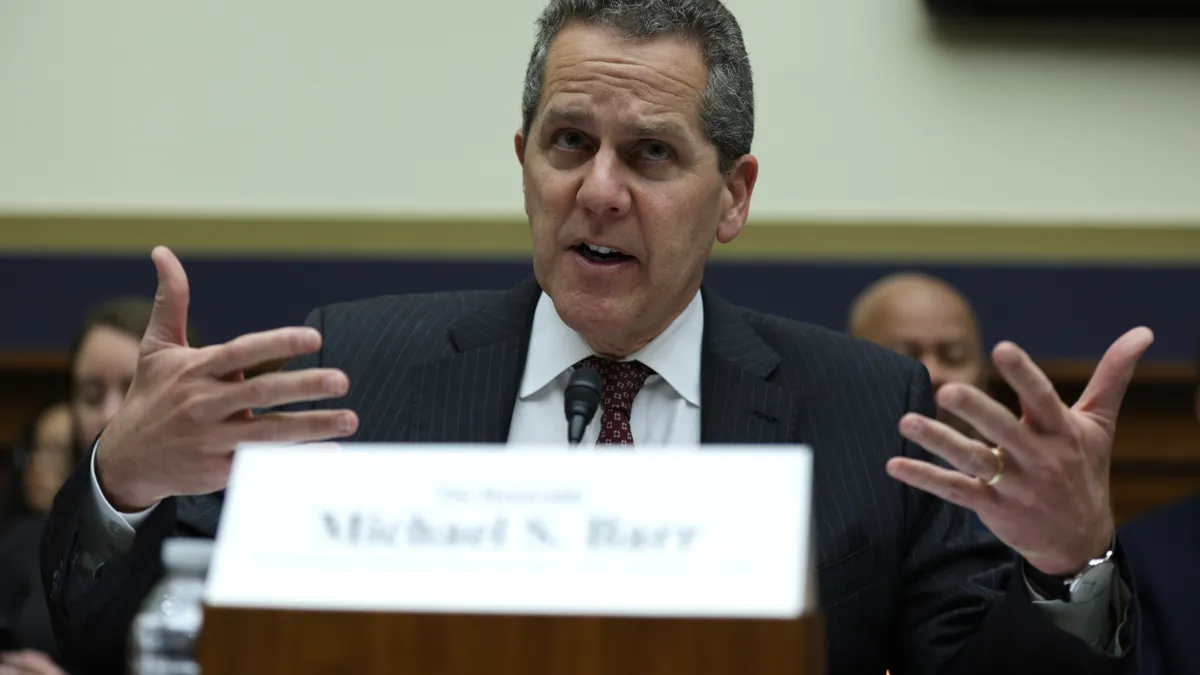As top bank regulators modify a forthcoming rule regarding capital requirements, they haven’t yet decided whether to amend or reissue the proposal, said Michael Barr, the Federal Reserve’s vice chair for supervision, during a Senate panel hearing Thursday.
Barr, along with Michael Hsu, acting comptroller of the currency, and Martin Gruenberg, chair of the Federal Deposit Insurance Corp., appeared before the Senate Banking Committee during a semiannual oversight hearing. All three told lawmakers this week they’re still focused on substance over process, and it hasn’t yet been decided whether regulators will tweak their original proposal or withdraw the current proposal and issue a new one.
Banking regulators released a proposal last July that would require the biggest U.S. banks to hold roughly 19% more capital and align them more closely with the Basel III endgame. The proposal would alter how banks assess risk and affect how much capital needs to be held to guard against potential losses.
Banks with between $250 billion and $1 trillion in assets face about a 10% uptick, while banks with $100 billion to $250 billion would see a 5% jump. Banks and industry groups have pushed back on the proposal, saying it could require them to cut some services or increase fees.
In testimony this week to lawmakers, Barr said the regulatory agencies have received substantive comments and additional data and expect to “have a set of broad, material changes to the proposal that allow us to have a broad consensus in moving the proposal forward.”
That includes changes related to operational risk, credit risk and market risk, Barr told House Financial Services Committee members Wednesday.
Barr’s comments mirror those of his boss, Fed Chair Jerome Powell, who, in March, told House lawmakers he expects “broad and material changes” to the proposal.
Barr repeatedly declined to provide lawmakers with a time frame for those changes, and noted a Bloomberg report this month — which mentioned the plan could be finalized as soon as August — was not reflective of regulators’ timing.
Still, when pressed by Sen. Elizabeth Warren, D-MA, on whether they are committed to finalizing “a strong rule this fall,” all three said yes.
During Wednesday’s hearing, Reps. French Hill, R-AR, and Andy Barr, R-KY, pointed to case law indicating broad and material changes require withdrawal and re-proposal. If there are substantive changes to the proposal, “to this committee, many of us believe that means this rule should be re-proposed,” Hill said.
“We will follow the law, we will follow the Administrative Procedures Act, there is no question about that,” Michael Barr said. “We just haven’t turned to the procedural question yet. We’re focused right now on the substance.”
During Thursday’s Senate committee hearing, Sen. Tim Scott, R-SC, echoed Hill’s and Andy Barr’s concerns, saying “slicing it, dicing it, trying to figure out how to make some changes and put it back on the market” is the wrong approach to the capital requirements proposal.
A full re-proposal would allow for comments and further engagement, and “anything other than that, I think, is nibbling around the edges,” said Scott, the Senate Banking Committee’s ranking member.
Rep. Patrick McHenry, R-NC, and 28 other Republicans in Congress wrote regulators in March urging withdrawal and re-proposal because the measure, as written, “lacks quantitative analysis, and is procedurally flawed.”
At least one senator from across the aisle likewise demanded data justifying the proposal.
“Wherever you come down, we’re going to need that evidence-based approach,” Sen. Mark Warner, D-VA, told regulators Thursday.
The committee’s chairman, Sen. Sherrod Brown, D-OH, noted none of the CEOs of the country’s largest banks have said they’ll be unable to meet the capital requirements set forth in the proposal, which is why it’s “imperative” the agencies finalize the proposal, and not “reward Wall Street’s whining.”
During Thursday’s hearing, most senators also voiced their concerns with the pervasive harassment and discrimination issues at the FDIC, outlined in an independent report released last week, and multiple Republicans called for Gruenberg’s resignation, as House lawmakers did Wednesday.
Senators noted an anonymous group of FDIC whistle-blowers expressed their lack of confidence in Gruenberg’s ability to transform the agency. Lawmakers called for a separate hearing to discuss the issue exclusively, and a progress report in three months, to assess the FDIC’s headway in making change.
“This should be the last report we deal with on this particular issue. And we are going to hold you accountable,” Sen. Catherine Cortez Masto, D-NV, told Gruenberg.
Sen. John Kennedy, R-LA, pledged to introduce a bill that would extend the statute of limitations “to allow every employee at the FDIC to file suit over the sexual abuse and the sexual discrimination and this racism.”





















